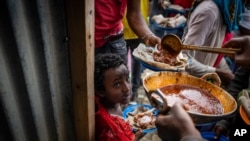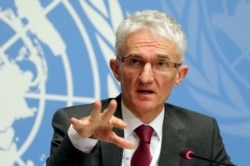The United Nations humanitarian chief warned Tuesday that the 1984 famine that killed more than 1 million Ethiopians could occur again if aid access to that country's northern Tigray region is not quickly improved, scaled up and properly funded.
"There is now famine in Tigray," aid chief Mark Lowcock told a private, informal meeting of the U.N. Security Council on Tuesday, according to a copy of his written remarks seen by VOA.
He said the Tigray administration has reported deaths from starvation.
"The situation is set to get worse in the coming months, not only in Tigray, but in Afar and Amhara, as well."
Last week, urgent calls went out from the U.N. and partner aid agencies for a humanitarian cease-fire. It came on the heels of a report warning that 350,000 people were already in famine conditions in Tigray and that 2 million more were just a step away.
The Integrated Food Security Phase Classification, or IPC as it is known, reported that more than 5.5 million people overall were in crisis levels of food insecurity in Tigray and the neighboring zones of Amhara and Afar.
The U.N. children's agency UNICEF has also warned that 33,000 severely malnourished children in currently unreachable areas of Tigray are also at high risk of death.
The scope of the problem is massive. Lowcock said there were 123 humanitarian agencies operating in the area and 10 times as many aid workers in Tigray today than at the start of the crisis in November.
"But substantial further scale-up is urgently required if we are to make a significant impact on growing needs," Lowcock said.
The United Nations has appealed for $853 million to assist 5.2 million people until the end of the year, with almost $200 million needed before the end of July.
Access to people in remote and hard-to-reach areas has been an ongoing problem since the conflict erupted in November between the Tigray People's Liberation Front and the government of Ethiopian Prime Minister Abiy Ahmed.
Ethiopia's U.N. ambassador, Taye Atske Selassie Amde, said the situation did not warrant security council attention. He added that his government "vehemently disagreed" with the humanitarian assessment, saying data was collected in a "very botched" way.
"Having said that, using humanitarian issues, particularly famine and starvation, in order to exert undue pressure on Ethiopia is completely unacceptable," he told reporters after the meeting.
"It's not a drought or locusts that are causing this hunger, but the decisions of those in power," British Ambassador Barbara Woodward said. "That means those in power could also end the suffering."
She added that Eritrean forces need to leave Ethiopia.
"We were told in March that Eritrean forces would be withdrawing. It's now June. There can be no further delay," she told reporters.
The Ethiopian envoy said the delay was due to "sorting some technical and procedural issues."
"Our expectation is that they will definitely leave soon," he said.
U.S. envoy Jeffrey DeLaurentis told council members that "we have to act now" to prevent a famine, according to a diplomat familiar with the council's discussion.
DeLaurentis also called for an urgent end to hostilities, unhindered aid access and a political dialogue to resolve the crisis, as well as accountability for those responsible for human rights abuses.
The U.N. Security Council has held a handful of private meetings on the growing crisis but has failed to take any serious action to pressure the parties to stop the fighting, allow aid workers safely in and get Eritrea's troops to leave.
In April, the council issued a statement calling for better humanitarian access, but it has taken no action to pressure spoilers to comply.





